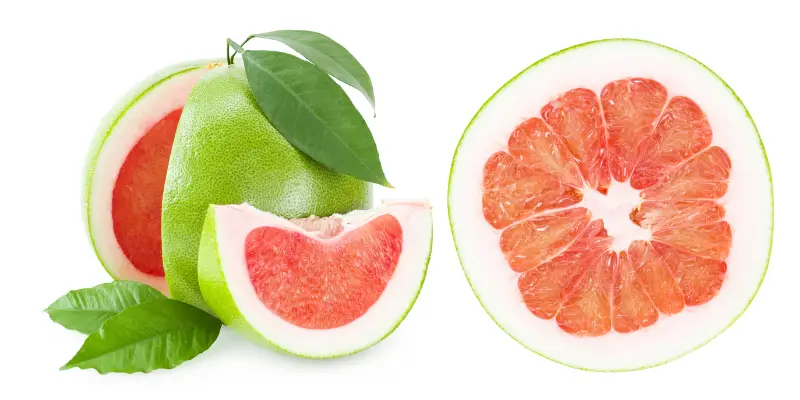Table of Contents
As a pet owner, you should know which foods are healthy for your dog, including pomelo. Pomelos is a popular citrus fruit enjoyed by humans, but can dogs eat pomelo? While pomelo is not inherently toxic to dogs, it’s essential to consider factors like sugar content and the possibility of gastrointestinal upset. As dogs’ dietary needs differ from those of people, what is good for us might not be suitable for them.
This article discusses if dogs can eat pomelo and how to add pomelo to a dog’s food correctly. It explains how much to use and why it’s suitable for a dog’s diet. The main purpose is to explain to dog owners the best ways to use the pomelo for dogs.
Can Dogs Eat Pomelo?
Dogs can eat pomelo in very small quantities, as it’s not toxic to them. However, the high acidity and large amounts of sugar found in pomelo can lead to digestive upset if consumed in significant amounts. It’s always best to introduce any new food into your dog’s diet gradually and in moderation.
What is Pomelo?
Pomelo is a large fruit and looks like a grapefruit. It has a thick yellow or green layer outside. Inside, it is divided into juicy pink or white segments, just like the oranges. Pomelo has a tangy-sweet flavour that is similar to that of grapefruit and orange. It’s often eaten raw or added to salads and desserts.

Should Dogs Eat Pomelo?
To answer the question, can dogs eat pomelo? Yes, dogs can eat pomelo, but only in a very small amount. Pomelo is not toxic, but dogs can eat pomelo if given carefully and in moderation due to their sugar content and citric acid, which can cause stomach upset.
The skin and seeds cause choking, so only the flesh should be offered. Pomelos are not a necessary part of a dog’s diet, as dogs naturally produce sufficient vitamin C, and their nutritional needs are primarily met through dog food. Introduce pomelos slowly to monitor for adverse reactions, and always consult with a veterinarian before adding new foods to your dog’s diet.
Are Pomelos Good for Dogs?
Pomelos are not an essential diet for dogs, but they are suitable for their health as pomelos contain vitamin C and fiber. The high sugar content and citric acid in pomelos could potentially lead to digestive issues or dental problems.
While not toxic, pomelos should be given in moderation, and only the flesh should be offered, avoiding the rind and seeds. Introducing pomelos gradually is important to ensure your dog will tolerate them. Always consult a veterinarian before feeding pomelo to your dog or adding any new food to your dog’s diet.
Also Read: Is Xanthan Gum Safe For Dogs?
Potential Benefits of Pomelo
Pomelo is suitable for dogs if given in small amounts. They have vitamin C for the immune system and fiber for digestion. They also contain antioxidants for overall health. Pomelos provide water for hydration in hot weather. However, they are not essential and can pose risks to a dog’s health.
Potential Risks of Pomelo
Feeding pomelo to dogs may be risky in some conditions because it contains citric acid and has a high sugar content. The thick skin and large seeds of pomelos can pose a choking hazard and may cause intestinal blockages, particularly in smaller breeds.
Excessive consumption of pomelo might lead to dental issues from the sugar content and potential weight gain. Some dogs may have allergic reactions or increased sensitivity to citrus fruits like pomelo. It’s important to introduce pomelo carefully and in small quantities to monitor any adverse reactions in your dog.

Do Dogs Need Fruits to Be Healthy?
Dogs do not necessarily need fruits to be healthy, as their primary nutritional requirements are typically met through balanced dog food. However, many fruits may include extra vitamins, minerals, and fiber, which can be helpful if taken in balance.
Fruits should be considered as treats and should not replace a significant portion of a dog’s regular diet. It’s important to choose fruits that are safe for dogs and to introduce them slowly to avoid digestive issues. Always consult with your veterinarian before making any changes to your dog’s diet, such as introducing pomelo to dogs.
Which Fruits Are Safe for Dogs?
Several fruits are safe and can be healthy treats for dogs when given in moderation. Following is a list of some fruits that are good for your dog:
- Apples (without seeds or core)
- Bananas
- Blueberries
- Cantaloupe
- Cranberries
- Mango (without the pit)
- Oranges (in moderation, without seeds or peel)
- Peaches (without the pit)
- Pears (without seeds or core)
- Pineapple (without the skin and core)
- Raspberries
- Strawberries
These fruits offer various vitamins, minerals, and fiber, beneficial to a dog’s diet. Always introduce new fruits gradually to ensure they don’t cause digestive upset. It’s important to avoid fruits that are toxic to dogs, such as grapes and raisins.

Which Fruits Shouldn’t Be Given to Dogs?
Certain fruits are bad for dogs and should be avoided. Grapes and raisins – Even small amounts can cause kidney failure in dogs. Following is the list of some fruits that may be risky if given to dogs:
- Cherries – The pits contain cyanide, which is toxic to dogs.
- Avocado – The persin in avocado can cause vomiting and diarrhea in dogs.
- Citrus fruits (lemons, limes, grapefruits) – The acids and oils can cause irritation and even central nervous system depression in dogs.
- Persimmons – The seeds can cause intestinal blockage, and the flesh may cause inflammation of the intestines in dogs.
- Pits and seeds from any fruit – These can pose choking hazards or contain cyanide-like compounds, which are toxic to dogs.
- Rhubarb – The leaves contain oxalic acid, which can cause kidney problems in dogs.
- Fruit with added sweeteners or artificial ingredients – These can be harmful to dogs, causing digestive upset or other health issues.
Is Pomelo Allergic for Dogs?
Yes, dogs can be allergic to pomelo, just like other foods. In dogs, allergic reactions may include diarrhea, skin irritations, or itching. See a vet immediately if your dog shows any unusual signs after a pomelo meal, such as swelling or difficulty breathing. Add a small quantity of pomelo to your dog’s food and watch for negative reactions. Always put your dog’s health and dietary needs first when introducing new food.

Frequently Asked Questions
Q1: Can pups consume pomelo?
Ans: Feeding pomelo to puppies is generally not recommended, as their digestive systems are more sensitive, and the fruit could cause gastrointestinal upset.
Q2: Is the rind of the pomelo safe for dogs?
Ans: No, the pomelo rind is unsafe for dogs as it can cause a choking hazard, is difficult to digest, and may contain harmful substances. Offer your dog only the fruit’s flesh.
Q3: Are pomelo seeds safe for dogs?
Ans: No, dogs shouldn’t be given pomelo seeds as they pose a choking hazard and could contain dangerous ingredients. Always take out the seeds before giving your dog a pomelo.
Q5: How much pomelo is safe for my dog to eat?
Ans: If you choose to give pomelo to your dog, offer it in small amounts, such as a few bite-sized pieces, and always monitor for any adverse reactions.
Conclusion
To wrap up the question, Can dogs eat Pomelo? is met with a cautious Yes. Pomelos can be okay for dogs, but you must be careful. Only give them a little bit at a time. Dogs can eat pomelo, which may be beneficial to them, but there are dangers as well. It is important to observe your dog’s behavior after a pomelo meal. Asking a veterinarian for guidance is usually a smart option if you’re unsure.
To keep your dog healthy, it’s vital to make sure they eat a variety of foods. Too much of anything, including pomelo, isn’t good. Pomelo can only provide part of the nutrients that dogs require to live healthy lives. Always think about what’s best for your dog’s health. Giving your dog the right amount of everything is the best way to keep them happy and healthy.

